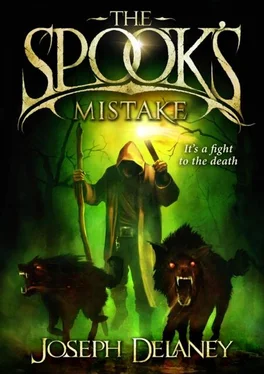I thanked him for the offer, then handed him the envelope with a coin to pay the post wagon. He promised to drop it off at Priestown. As he harnessed the horses, I lifted one of the barrels. Although relatively small, it was heavy. I tried positioning it under my arm.
'On your shoulder! That's the best way!' Mr Gilbert called out cheerfully.
His advice proved sound. Once in position, the barrel proved easy to carry. So, with Claw at my heels, I made the five trips to the house in just under half an hour.
After that, Arkwright gave me another theory lesson.
'Open up your notebook, Master Ward. '
I opened it immediately and looked up, waiting to hear what he would say.
'Your heading is "Morwena",' he told me. 'I want you to write down everything I've told you and you've read so far. Such knowledge will come in useful. It'll soon be time to go a-hunting. We've got her finger and we'll be putting it to very good use.'
'How are we going to use it?' I asked.
'You'll find out soon enough, so curb your impatience. The dog's wounds don't seem to have become infected, and so far your ear hasn't dropped off. Assuming there's no change tomorrow, we'll set off across the sands to Cartmel. If we find out what we need to know — well then, we might not be back here for quite some time. Not until we've dealt with Morwena once and for all!'
CHAPTER 13
The hermit of Cartmel
Soon after dawn the following day, with the dogs at our heels, we made our way towards Cartmel: the quickest way was across the sands of Morecambe Bay. It was another bright day and I was happy to get away from the mill for a while. I was looking forward to seeing the County north of the bay with its picturesque mountains and lakes.
Had I been with the Spook, I'd have been carrying both bags but it seemed that Arkwright always carried his own. We didn't have very far to walk before we reached Hest Bank, the starting point for our journey across the sands. Here we found two coaches and three horsemen, as well as a number of people on foot. The bare sands seemed to be inviting us to cross, and the sea was a long way out; I wondered what they were all waiting for and asked Arkwright.
'It may look safe now, but the sands of the bay can be treacherous,' he replied. 'A sand guide will walk ahead of the front coach — a man who knows the tides and terrain like the back of his own hand. We have to cross two river channels — the second one in particular, the Kent, can be dangerous after heavy rains. It can turn to quicksand. We're waiting now for the ebb tide to reach the point that'll give those carriages time to cross safely.
'Never try to walk across the bay without a guide, Master Ward. I've lived here most of my life and even I wouldn't try it. You might have just learned to swim but even a grown man with years of experience wouldn't survive. The water comes in down the channels so fast you can soon get cut off and drown!'
A tall man wearing a wide-brimmed hat approached; he walked barefoot and carried a staff.
'This is Mr Jennings, the sand guide,' Arkwright told me. 'He's watched over these sands for almost twenty years.'
'It's a grand day!' Mr Jennings called out. 'Who's this you've got with you, Bill?'
'A good day to you, Sam. This is Tom Ward, my apprentice for the next six months.'
The sand guide's suntanned, weather-beaten face cracked into a smile as he shook my hand. He had the air of a man who enjoyed his work. 'No doubt, Bill, you'll have warned him of the dangers of these sands?'
'I've told him all right. Let's just hope he listens.'
'Aye, let's hope so. Not everybody does. We should be setting off in about half an hour.'
That said, he moved away to chat to the others. Eventually we set off, Sam Jennings striding ahead of the coaches, with those on foot bringing up the rear. The flat sands were still wet and marked with an intricate pattern of ridges made by the tides. There had been hardly any wind before but now a stiff breeze was blowing into our faces from the north-west, while in the far distance the sun was dazzling off the sea.
The coaches travelled slowly and we caught them up when we reached the first river bed. Sam went down into the channel to inspect it, wading in as far as his knees. He paddled about two hundred paces east before whistling and waving his stick to indicate the point where we should cross. Then he walked back towards the first coach.
'This is where we get ourselves a ride!' Arkwright said.
He ran forward suddenly and jumped up onto the back of the rear coach. Following his lead, I soon saw why. As we crossed the channel, the water came up to the horses' bellies. We'd just saved ourselves a soaking. The dogs didn't seem to mind getting wet and swam strongly, reaching the far bank well before the horses.
We climbed down and walked for a while until we reached the channel of the river Kent, which proved to be about the same depth.
'I wouldn't like to be here when the tide's in!' I remarked.
'That you wouldn't, Master Ward. At spring tide the water would be deep enough to cover you three times over or more. See over there?' Arkwright asked, pointing towards the land.
I could see forested slopes with purple fells rising above.
'Those fells behind Cartmel — that's where we're heading. Soon be there now.'
The crossing was about nine miles but Arkwright told me that wasn't always the case. The course of the river Kent kept shifting so the distance to safe fording places varied. It was a dangerous place all right, but a much shorter route than following the curve of the bay.
We reached a place called Kent's Bank where, after paying and thanking the guide, we left the flat sands and began the climb up to Cartmel, which took us almost an hour. We passed a large priory, a couple of taverns and about thirty or so dwellings. It reminded me of Chipenden, with hungry children staring from doorways, the surrounding fields depleted of livestock. The effects of the war were widespread and would no doubt soon start to bite deeper. I thought we would stop and stay in Cartmel for the night but it seemed that our business lay further on.
'We're going to visit Judd Atkins, a hermit who lives up on those fells,' Arkwright said without even looking at me. His gaze was fixed upon the steep slope ahead.
I knew that a hermit was usually a holy man who liked to live alone beyond the reach of people, so I didn't expect him to be pleased to see us. But was he the one who'd be able to use the severed finger in some way to locate Morwena?
I was about to ask, but as we passed the last cottage, an old woman emerged from the gloom of her front room and shuffled out towards us down the muddy path.
'Mr Arkwright! Mr Arkwright! Thank the Lord you've come at last,' she exclaimed, grabbing his sleeve and holding it fast.
'Let me be, old mother!' Arkwright snapped, irritation in his voice. 'Can't you see I'm in a rush — I've urgent business of my own to attend to!'
For a moment I thought he would push her away and stride off but he glared down at her, the veins starting to bulge at his temples.
'But we're all scared rigid,' said the old woman. 'Nobody's safe. They take what they want, night and day. We'll soon starve if something ain't done. Help us, please, Mr Arkwright. '
'What are you babbling about? Who takes what they want?'
'A press gang — though they're more like common thieves. Not content with dragging our lads off to war, they rob us of everything we've got. They've made their den up at Saltcombe Farm. The whole village is scared witless. '
Was this the same press gang that captured me? They'd talked about heading north and had fled this way when Alice scared them. It seemed likely. I certainly didn't want to meet them again.
Читать дальше












